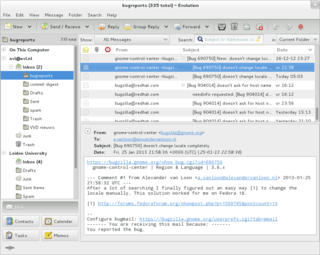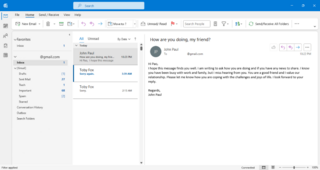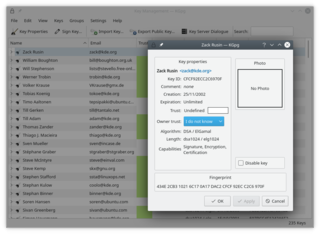
Electronic mail is a method of transmitting and receiving messages using electronic devices. It was conceived in the late–20th century as the digital version of, or counterpart to, mail. Email is a ubiquitous and very widely used communication medium; in current use, an email address is often treated as a basic and necessary part of many processes in business, commerce, government, education, entertainment, and other spheres of daily life in most countries.

Konqueror is a free and open-source web browser and file manager that provides web access and file-viewer functionality for file systems. It forms a core part of the KDE Software Compilation. Developed by volunteers, Konqueror can run on most Unix-like operating systems. The KDE community licenses and distributes Konqueror under GNU GPL-2.0-or-later.
In computing, the Post Office Protocol (POP) is an application-layer Internet standard protocol used by e-mail clients to retrieve e-mail from a mail server. Today, POP version 3 (POP3) is the most commonly used version. Together with IMAP, it is one of the most common protocols for email retrieval.
The Simple Mail Transfer Protocol (SMTP) is an Internet standard communication protocol for electronic mail transmission. Mail servers and other message transfer agents use SMTP to send and receive mail messages. User-level email clients typically use SMTP only for sending messages to a mail server for relaying, and typically submit outgoing email to the mail server on port 587 or 465 per RFC 8314. For retrieving messages, IMAP is standard, but proprietary servers also often implement proprietary protocols, e.g., Exchange ActiveSync.
In computing, a desktop environment (DE) is an implementation of the desktop metaphor made of a bundle of programs running on top of a computer operating system that share a common graphical user interface (GUI), sometimes described as a graphical shell. The desktop environment was seen mostly on personal computers until the rise of mobile computing. Desktop GUIs help the user to easily access and edit files, while they usually do not provide access to all of the features found in the underlying operating system. Instead, the traditional command-line interface (CLI) is still used when full control over the operating system is required.

Microsoft Outlook is a personal information manager software system from Microsoft, available as a part of the Microsoft 365 software suites. Though primarily being popular as an email client for businesses, Outlook also includes functions such as calendaring, task managing, contact managing, note-taking, journal logging, web browsing, and RSS news aggregation.

CUPS is a modular printing system for Unix-like computer operating systems which allows a computer to act as a print server. A computer running CUPS is a host that can accept print jobs from client computers, process them, and send them to the appropriate printer.

ClamAV (antivirus) is a free software, cross-platform antimalware toolkit able to detect many types of malware, including viruses. It was developed for Unix and has third party versions available for AIX, BSD, HP-UX, Linux, macOS, OpenVMS, OSF (Tru64), Solaris and Haiku. As of version 0.97.5, ClamAV builds and runs on Microsoft Windows. Both ClamAV and its updates are made available free of charge. One of its main uses is on mail servers as a server-side email virus scanner.
MHTML, an initialism of "MIME encapsulation of aggregate HTML documents", is a Web archive file format used to combine, in a single computer file, the HTML code and its companion resources that are represented by external hyperlinks in the web page's HTML code. The content of an MHTML file is encoded using the same techniques that were first developed for HTML email messages, using the MIME content type multipart/related. MHTML files use an .mhtml or .mht filename extension.
Transport Neutral Encapsulation Format or TNEF is a proprietary email attachment format used by Microsoft Outlook and Microsoft Exchange Server. An attached file with TNEF encoding is most often named winmail.dat or win.dat, and has a MIME type of Application/MS-TNEF. The official (IANA) media type, however, is application/vnd.ms-tnef.

Kontact is a personal information manager and groupware software suite developed by KDE. It supports calendars, contacts, notes, to-do lists, news, and email. It offers a number of inter-changeable graphical UIs all built on top of a common core.
The following tables compare general and technical features of notable email client programs.

KGpg is a graphical frontend to GnuPG for KDE, which includes a key management window and an editor. Users can easily create cryptographic keys, and write, encrypt, decrypt, sign, or verify messages. Through integration with the Konqueror browser/file manager, users can easily encrypt files by right-clicking and choosing Actions > Encrypt File. Left-clicking on an encrypted file in Konqueror will prompt the user for a password to decrypt the file. You can make public or private keys, and can export/import keys. A user can sign the keys, and set an expiration date.

Ark is a file archiver and compressor developed by KDE and included in the KDE Applications software bundle. It supports various common archive and compression formats including zip, 7z, rar, lha and tar.

KDE Software Compilation 4 was the only series of the so-called KDE Software Compilation, first released in January 2008 and the last release being 4.14.3 released in November 2014. It was the follow-up to K Desktop Environment 3. Following KDE SC 4, the compilation was broken up into basic framework libraries, desktop environment and applications, which are termed KDE Frameworks 5, KDE Plasma 5 and KDE Applications, respectively.
In the X Window System, an X session manager is a session management program, a program that can save and restore the current state of a set of running applications, including window manager.

KDE Plasma 4 is the fourth generation of the KDE workspace environments. It consists of three workspaces, each targeting a certain platform: Plasma Desktop for traditional desktop PCs and notebooks, Plasma Netbook for netbooks, and Plasma Active for tablet PCs and similar devices.

K Desktop Environment 3 is the third series of releases of the K Desktop Environment. There are six major releases in this series. After the release of KDE 4, version 3.5 was forked into the Trinity Desktop Environment.

Trojitá is a free software IMAP and SMTP email client developed using the Qt C++ library. The design goals of the maintainers are to develop a fast e-mail client which respects open standards, is cross-platform and uses the available resources very efficiently.

The KDE Gear is a set of applications and supporting libraries that are developed by the KDE community, primarily used on Linux-based operating systems but mostly multiplatform, and released on a common release schedule.











